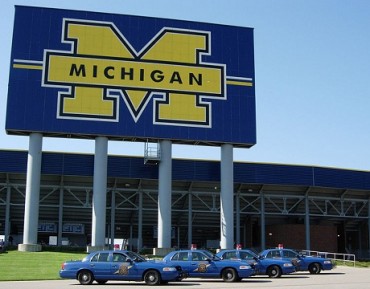
The University of Michigan Board of Regents voted last month to allow graduate student research assistants (GSRAs) to unionize. The vote was decided along partisan lines, with the two Republican regents—Andrew Richner and Andrea Newman—voting against the measure.
Richner and Newman, however, had an unlikely ally: U-M President Mary Sue Coleman.
As the head of a university with notably liberal student and faculty populations, Coleman has often championed progressive causes such as sustainability, affirmative action, and same-sex marriage. But on the issue of permitting GSRAs to unionize, Coleman’s views put her in the same camp as her Republican colleagues.
According to an article in The Michigan Daily, Richner said that it was unprecedented for the regents to disagree with the president on an issue of such importance.
Coleman stuck to her position in a statement released after the vote, where she characterized research assistants as students, not employees.
“I do not see research assistants as our employees but as our students,” Coleman said in her statement. “When I was a graduate student, I did not see myself as working for the university and I did not see my faculty mentor as my employer. Far from it. He was my mentor, my tutor, and my colleague as I progressed in my course of study.”
Coleman said that research assistants, unlike graduate student instructors—who may work for many different faculty members—fill specific needs and enjoy more personal relationships with their researchers.
Paul Kersey, director of labor studies at the Mackinac Center for Public Policy, shares this view.
“Graduate students are not employees, and collective bargaining is not appropriate here,” he wrote. “If this continues, graduate students are likely to find their degrees cheapened and their research opportunities limited.”
University policy dating back to 1981 held that GSRAs were not considered employees of the university as far as collective bargaining was concerned. But on May 19, Regent Julia Darlow introduced a resolution that would permit GSRAs to opt for union representation. Darlow, who did not respond to repeated requests for comment, voted along with the five other Democrats to pass the resolution.
It is now up to the GSRAs to decide whether to join the Graduate Employees’ Organization, the union that represents graduate student instructors and an affiliate of the American Federation of Teachers in Michigan. Rick Fitzgerald, a spokesperson for the university, said that GEO has petitioned the state to arrange a vote on unionization for the GSRAs.
“That’s a vote that’s still to come,” Fitzgerald said. “Our expectation is that it will happen, but there are a lot of details to work out before a date can be set.”
Kersey is wary of such an election. In his view, it is part of a pattern of unions overstepping their bounds.
“We have recently seen unions attempting to insert themselves in areas that are not suited for union representation,” Kersey said. “Unions exist to represent employees in the workplace, not home-based small business owners whose customers may or may not receive a state subsidy, or family members who benefit from state aid that is intended to ease the burdens of caring for a loved one, or students who receive a stipend as they continue their studies.”
A GEO representative did not respond to a request for comment.
Like The College Fix on Facebook / Follow us on Twitter





Please join the conversation about our stories on Facebook, Twitter, Instagram, Reddit, MeWe, Rumble, Gab, Minds and Gettr.